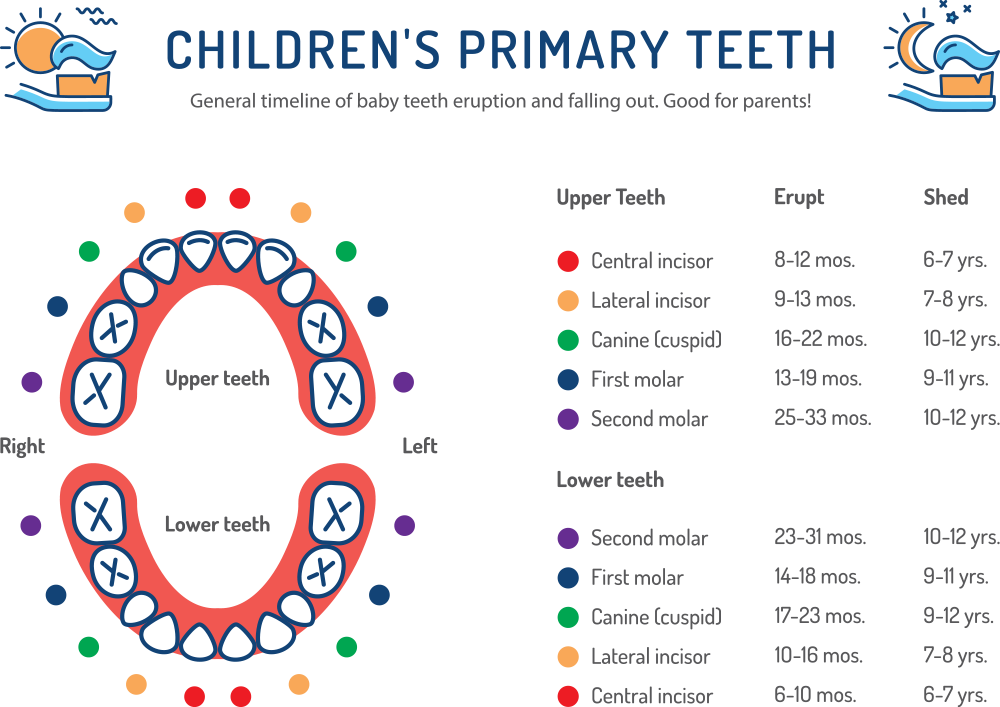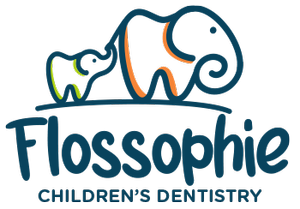The initial two years of your child’s life encompass a delightful, thrilling, yet undeniably exhausting journey! As a parent, witnessing your child explore the world and encounter countless “firsts” makes it all truly rewarding and worthwhile.
Indeed, one of those cherished first moments is none other than the emergence of your child’s teeth! Usually occurring between 6 to 10 months of age, your little one will begin to develop their primary teeth. As a caring parent, here are some essential insights to keep in mind for ensuring proper care of your child’s initial teeth, setting the stage for a healthy dental future!
Dental Care Facts for Infants & Babies in Duluth
Prioritizing your child’s dental health and overall well-being is crucial even before they are born and throughout their first year of life. For top-notch baby teeth care in Duluth, GA, partnering with the renowned specialists at Flossophie Children’s Dentistry is the ideal choice.
Here are essential steps to follow both before birth and up to your child’s first birthday to ensure their dental well-being:
Prenatal
According to the American Academy of Pediatric Dentistry (AAPD), it is highly recommended for all pregnant women to receive dental health care throughout their pregnancy. Research has shown a correlation between periodontal disease and preterm birth, as well as low birth weight. Moreover, mothers with inadequate dental health are at an increased risk of transmitting cavity-causing bacteria to their children.
To effectively address this concern, we strongly advise consulting your doctor or dentist to explore preventive measures and treatments for periodontal disease during pregnancy. There are several actions you can take to reduce this risk, such as maintaining regular visits to your dentist, practicing daily brushing and flossing, adopting a healthy diet low in sugars and starches, opting for fluoride toothpaste, and using an alcohol-free rinse daily.
It is essential never to share eating utensils or items that could potentially transmit bacteria to your children. If you enjoy chewing gum, choose a product that is sugar-free and contains xylitol, as it can help decrease the occurrence of cavities for both you and your children. By following these guidelines, you can significantly improve your and your children’s dental health and prevent potential issues in the future.
Infant Oral Care
At birth, babies usually have approximately 20 teeth that are partially formed within their gums. The first teeth to appear are the front two, starting with the lower ones and then the upper ones, which usually emerge between 6 to 12 months of age. By the time they reach 3 years old, most children have a complete set of 20 primary teeth, ready to serve them in their oral development.
To ensure optimal dental health for your child, the American Dental Association advises scheduling their first dental appointment between the arrival of their first tooth and their first birthday. This early visit helps in monitoring their dental growth and promoting proper oral care from the outset.

Early Childhood Caries
Early childhood caries, commonly known as “nursing decay” or “baby bottle tooth decay,” is a serious condition caused by prolonged exposure of an infant’s teeth to sugary liquids. These liquids encompass milk, breast milk, formula, juice, and other sweetened beverages.
Putting your baby to sleep, whether for a nap or bedtime, with a bottle containing anything other than water can lead to rapid and severe tooth decay. The sugars in the liquids accumulate around the teeth, providing an opportunity for bacteria within plaque to generate acid, which attacks the tooth enamel.
While it may be challenging to soothe a baby to sleep without a bottle, we strongly recommend offering only water in the bottle. If necessary, you can gradually dilute their usual drink with water over several weeks until it contains only water.
Furthermore, after each nighttime feeding, it is essential to wipe your child’s gums and teeth with a damp washcloth to remove the plaque buildup. By following these preventive measures, you can safeguard your child’s dental health and prevent early childhood caries.
Sippy Cups
Sippy cups are useful training tools to aid your child in transitioning from a bottle to a cup, but they should no longer be relied upon after their first birthday. If your child still uses a sippy cup during the day, it’s best to fill it with water only, especially between meals. Prolonged exposure to sugary liquids in sippy cups can lead to an increase in cavity-causing bacteria in your child’s mouth. To promote better dental health, opt for water in the sippy cup and gradually encourage them to use regular cups as they grow.
Primary Teeth are Very Important!
Parents often wonder, “Why are baby teeth so important if they will eventually fall out?” It’s a valid question, but premature visits from the tooth fairy can be problematic. Here’s why:
Primary teeth play a crucial role in ensuring there is sufficient spacing between teeth. Proper spacing is essential for the healthy development of permanent teeth, and without it, there’s a higher likelihood that adjacent baby teeth can tilt or shift which in turn increases the likelihood that your child may require braces in the future.
Moreover, these primary teeth provide vital form and function for your child’s mouth and face as they go through rapid growth during their early years.
While it’s easy to dismiss primary teeth as not being permanent, they are, in fact, significant. Caring for your child’s primary teeth is just as essential as caring for their permanent adult teeth. By maintaining proper oral hygiene and regular dental care, you are setting the foundation for your child’s long-term dental health and overall well-being.
Tips to Deal with Teething
Teething can be a challenging phase for both babies and parents, but rest assured, it’s not the end of the world, even if it feels that way at 3 am with a crying child! To help your baby navigate through this stage, here are a couple of helpful tips:
Firstly, offer your baby something hard to chew on that is also edible. This will help prepare their gums for tooth eruption. Options like a carrot or cucumber can be great choices as they provide relief and are safe for your little. Try using a damp washcloth that is twisted and frozen (tie one end with a knot for better gnawing). Avoid using teeth rings that are frozen.
Secondly, we would occasionally recommend using Children’s Tylenol® or Children’s Motrin® to ease your child’s discomfort during teething. It’s always a good idea to consult us at Flossophie or your pediatrician to discuss the best teething remedies
By applying these tips, you can make the teething process more manageable for your baby and find some relief for yourself as well. Remember, this phase will pass, and your child’s adorable smile will shine through once their new teeth emerge.
Don’t Put Your Baby to Bed with Milk
It’s common for parents to put their children to sleep with a bottle of milk, but in reality, this practice can be harmful to your child’s teeth.
The sugar in milk can contribute to baby bottle tooth decay, making it essential to avoid giving milk right before bedtime. While it is perfectly fine for your child to enjoy milk (assuming no allergies), it’s crucial to clean their teeth and gums after they have had milk before going to bed for the night. This simple step can help protect their dental health and prevent potential issues in the future.
How to Carefully Clean Primary Teeth
Its essential to properly brush your kids’ teeth as soon as the first tooth erupts in. We do not recommend using a fluoride toothpaste for any child under the age of 6 months. We do recommend using a small pea-sized amount kids fluoridated toothpaste for kids over the age of 3 and a very tiny smear for kids under the age of 3.
Keep in mind that your child’s teeth and gums are delicate during this time, so be gentle and avoid applying excessive pressure while cleaning. Being attentive to their oral care with a cautious approach will help promote a healthy and happy dental development for your little one.
Your Child’s First Dental Visit
As a pediatric dentist, with years of specialized training in caring for young children, we strongly recommend bringing your child to see a pediatric dentist around their first birthday. If you notice any concerns before that, feel free to schedule an appointment even sooner.
At Flossophie Children’s Dentistry, we conduct dental exams on young children around their first birthday to ensure their teeth and gums are in good health and developing appropriately. Our experience in treating many young children allows us to quickly identify any issues that may require attention and address them promptly. Your child’s oral health is our top priority, and early visits to the dentist can help set the foundation for a lifetime of healthy smiles.
